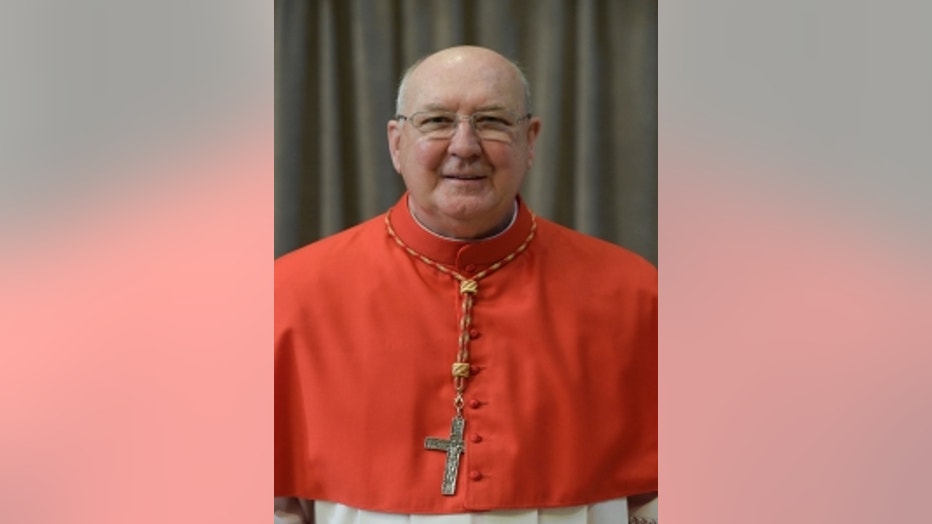Former Dallas Bishop could serve crucial role if Pope Francis resigns
Pope Francis showing signs of early kidney failure
Pope Francis remains in the hospital in critical condition on Sunday. The Vatican says the pontiff is showing signs of kidney failure. The news has affected millions of Catholics around the world, including those in Dallas-Fort Worth.
With Pope Francis in critical condition, some believe the pontiff may resign the papacy.
If the pope were to resign or pass away, a former Dallas bishop may be among the favorites to succeed him.
READ MORE: Pope Francis' health raises concerns among DFW Catholics
Cardinal Kevin Farrell

Cardinal Kevin Farrell (Source: The Vatican)
The backstory:
Kevin Farrell was Bishop of the Dallas Catholic Diocese from 2007 to 2016.
On August 15th, 2016, Pope Francis called the Irish-born Farrell to serve in the Roman Curia, elevating him to the position of Cardinal.
Since then, Farrell has moved up within the Catholic Church.
In February 2019, Pope Francis named him the Camerlengo of the Holy Roman Church.
That title means Cardinal Farrell would become the interim pope if Francis was unable to serve as church's leader until the College of Cardinals elected a new pontiff. In the interim position, he would be responsible for overseeing the administration of the church. The camerlengo is also responsible for preparing the papal conclave to elect a new pope.
The 77-year-old Farrell has held several important titles within the church.
In September 2020, Pope Francis appointed him to be the president of the Commission for Confidential Matters.
In June 2023, he was named President of the Vatican City State Supreme Court.
Farrell has served as an ordained priest since 1978.
Will Pope Francis resign?
Big picture view:
Pope Francis’ hospitalization has fueled speculation about his possible resignation if he becomes irreversibly sick and unable to carry on.
The speculation carries more weight since Pope Francis’ predecessor, Pope Benedict XVI, resigned in 2013.

Balloons and candles left by the faithful below the sculpture of St. John Paul II are seen at the main entry of the Policlinico A. Gemelli Hospital where Pope Francis is being treated for a double pneumonia on February 23, 2025 in Rome, Italy. (Photo
Pope Benedict became the first pope in 600 years to retire when he concluded that he didn’t have the physical strength to carry on the rigors of the globe-trotting papacy.
Can Pope Francis resign?
What we know:
Yes, Pope Francis is allowed to resign.
In the Catholic Church, the official laws on all matters are codified in the Latin edition of the Code of Canon Law. The option of a pope to resign is explicitly written into the Canon Code of Law, according to the Catholic News Service (CNS).
The only conditions are that the decision be made freely and be publicly manifested. There is no specific person or body that must accept a pope’s resignation.
"If it should happen that the Roman Pontiff resigns his office, it is required for validity that he make the resignation freely and that it be duly manifested, but not that it be accepted by anyone," the law states.
Pope Francis’ stance on resigning
What we don't know:
It’s unclear whether Pope Francis is considering stepping aside.
Francis has previously said he would consider retiring, after Benedict "opened the door" to the resignation of modern-day popes, but Francis has shown no signs of stepping down and has asserted recently that the job of pope is for life.
Francis also confirmed in 2022 that, shortly after being elected pontiff in 2013, he wrote a resignation letter in case medical problems impeded him from carrying out his duties.
RELATED: Biden awards Pope Francis the Presidential Medal of Freedom
The other side:
"Everything is possible," said Cardinal Jean-Marc Aveline, the archbishop of Marseille, France, when asked last week about the possibility of Pope Francis resigning. Another cardinal, Gianfranco Ravasi, suggested that it was more than just a possibility.
What happens if Pope Francis resigns?
Dig deeper:
In the modern history of the Catholic Church, only the resignation of Pope Benedict XVI in 2013 serves as precedent. When he resigned, his intentions were made public and the process began to elect his successor, just as would have happened if he had died.
The same can be expected if Pope Francis resigns - a conclave will be convened to elect a successor.
What is a conclave?
What's next:
When a pope dies or resigns, cardinals are summoned to Rome to participate in a conclave, or secret meeting, to vote for a new pope.
A candidate must get two-thirds of the vote to become pope. The voting cardinals must be under 80 years old.
Four rounds of balloting take place every day until a candidate receives the necessary number of votes.
The Source: This report includes information from the Vatican's website, the Associated Press, 1983 Code of Cannon Law and previous FOX News Digital reporting.

